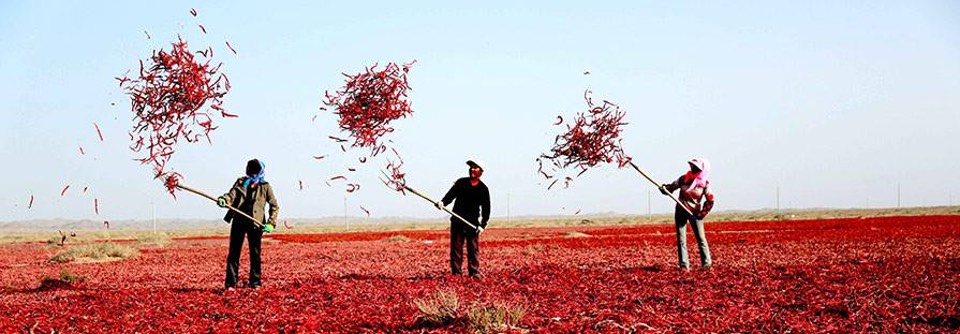
Podcast: Play in new window | Download (Duration: 30:02 — 27.6MB)
Subscribe: Google Podcasts | Spotify | Android | RSS | More

Think of Szechuan food and you think of hot and spicy, chilli-laden dishes. At least, I do. Chilli pepper is firmly established as the most widely used spice around the world, and nowhere more so than in China. And yet, chillies were unknown in China before about 1570. They arrived by at least three different routes, almost certainly more than once in each area, and found favour with ordinary Chinese people extremely rapidly. The ruling classes were not nearly as taken with them, and by and large failed to understand their importance. That contrast lasted through the first two centuries of the chilli in China, although it did not stop chillies eventually permeating Chinese culture high and low. For the people of Szechuan and Hunan, they became an essential part of their identity.
All this, and much, much more, comes from a new book by Professor Brian Dott, of Whitman College in Washington State. He combed through ancient texts and modern to trace the history of chillies in China and how they became such an essential element of life for so many people.
Notes
- Brian Dott’s book The Chile Pepper in China is published by Columbia University Press. This link will help you buy it from an independent bookshop in the US and this one in the UK. Both probably ship elsewhere too.
- You can download a transcript, thanks to the generosity of people who support the show financially. Think about joining them.
- I have no idea whether this version of Spicy Girls is a good one, but I thought I would share it anyway.
- Banner photo, by Xinhua, shows farmers in Gansu Province airing drying chillis. I got it here uncredited.

[…] (and Jeremy) discusses how the chilli pepper got to China. Goes well with fish. The pepper, not the […]
If you listened to my podcast How the chilli pepper conquered China, you may be wondering, if you care about these things as I do, why there is a chilli species called Capsicum chinense.
The chilli didn’t reach China until the 1570s or thereabouts, and capsicums in the wild are restricted to the Americas, yet C. chinense is a perfectly valid species name. Indeed, many of the hottest peppers in the world have the distinction of belonging to that species, which also includes the more familiar Habanero and Scotch Bonnet varieties.
Start searching, and you learn that the species was described and named by Nikolaus Joseph von Jacquin in 1776. He was a Dutch scientist who ended up working for the Austrian crown and undertook an impressive early collecting trip in the Caribbean. Von Jacquin’s family was highly regarded in Vienna, where Mozart taught his daughter piano and wrote songs for his son. He was also one of the earliest promoters of the Linnean system of binomial nomenclature, and enjoyed a long friendship and correspondence with Linnaeus.
A most difficult taxonomic morass
There are five domesticated species of Capsicum (and some hybrids) and three of them — C. annuum (by far the most common), C. frutescens (Tabasco, and not a lot else) and C. chinense — are not easy to tell apart. Most descriptions focus on the number of flowers that grow from the base of each leaf, 2–5 in chinense as opposed to only a single flower in annuum. The three interbreed to varying extents and back in 1993 one expert said their classification “has been and continues to be a most difficult taxonomic morass”.[1] Modern molecular methods back that up; the three arise from a single ancestor and are one another’s closest relatives.
Von Jacquin’s description[2] does not say why he thought it was from China. It does say, roughly, “I saw [them] cultivated on the island of Martinique, and seeds used in cooking.”
Von Jacquin seems to have described a cultivated variety growing the gardens of Schönbrunn Palace outside Vienna. Almost 200 years later, the species was identified in the wild
Paul Smith and Charles B. Heiser Jr did an exhaustive study of wild and weedy capsicums from all over, in the course of which they found that some plants from Central and South America did not fit into any of the species they had previously recognised.[3] Though it apparently piqued them to admit it, these plants clearly belonged to what they called Capsicum sinense.
Smith and Heiser offered an “emended” description that places special emphasis on the 3–5 flowers at each node and a marked constriction at the base of the calyx. They then say:
I see only one pedicel at the nodes in von Jacquin’s plate, above. Maybe Smith and Heiser were looking at a different one. In any case, I quite like the fact that von Jacquin, who worked to promote Linnean binomials, gets the last laugh because he got the first name. Did the plants he described come from China? He must have thought so.
Wikipedia’s view is that von Jacquin “believed they originated in China due to their prevalence in Chinese cuisine after their introduction by European explorers,”[4] and it cites a chapter by Paul Bosland in support. Chastened by the whole spinach thing, I checked.
Bosland says “the French taxonomist who named this species in 1776 got his seed from China”. Leave aside that von Jacquin was born in The Netherlands and working in Austria at the time; what is Bosland’s source? None other than Smith and Heiser (1957).
And they say absolutely nothing about the source of von Jacquin’s seeds.
The mystery, then, abides. Maybe someone with access to the archives at Schönbrunn Palace or the University of Vienna botanical gardens could take a quick poke around and see if there is any indication of the geographical origin of the plants that von Jacquin named Capsicum chinense.
Eshbaugh, W.H. 1993. History and exploitation of a serendipitous new crop discovery. p. 132–139. In: J. Janick and J.E. Simon (eds.), New crops. Wiley, New York. ↩
Images from von Jacquin’s Hortus Botanicus Vindobonensis at the Biblioteca Digital del Real Jardin Botanico de Madrid. ↩
Smith, P.G. and C.B. Heiser. 1957. Taxonomy of Capsicum sinense Jacq. and the geographic distribution of the cultivated Capsicum species. Bul. Torrey Bot. Club 84:413–420. ↩
Untrue, as they were almost certainly introduced by crew members on ships, probably Chinese, and certainly not “explorers”. ↩
Another really interesting listen from @jeremycherfas I alway am amazed at how a food stuff becomes embedded in a culture.
eatthispodcast.com/China-chilli
How China got hot
eatthispodcast.com/China-chilli